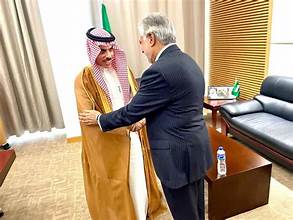Pakistan’s Deputy Prime Minister and Foreign Minister, Ishaq Dar, has arrived in Saudi Arabia to participate in the upcoming session of the Organization of Islamic Cooperation’s Council of Foreign Ministers (OIC-CFM). This development highlights Pakistan’s proactive engagement with the Muslim world and reaffirms the country’s commitment to advancing mutual cooperation, solidarity, and dialogue within the Islamic bloc. The OIC-CFM session serves as one of the most important forums for addressing key political, economic, humanitarian, and security-related issues faced by the Muslim Ummah.
Importance of the OIC-CFM Platform
The Organization of Islamic Cooperation (OIC) is the second-largest intergovernmental organization after the United Nations, representing 57 member states across four continents. Its Council of Foreign Ministers (CFM) is responsible for policy-making, coordination, and implementation of collective decisions.
The OIC-CFM session is significant for several reasons:
- Addressing Political Challenges: It provides a platform to discuss global and regional political developments affecting Muslim-majority countries.
- Palestine and Kashmir: The forum traditionally takes a strong stance on issues such as the Palestinian struggle and the right of self-determination for the people of Jammu and Kashmir.
- Economic Cooperation: It also focuses on economic development and trade collaboration between member states.
- Countering Islamophobia: The OIC has been vocal in combating Islamophobia and ensuring that the rights of Muslims around the world are protected.
Ishaq Dar’s Role and Participation

Deputy Prime Minister Ishaq Dar’s presence at the OIC-CFM session underscores Pakistan’s commitment to playing an active and constructive role in the affairs of the Muslim world. As Pakistan’s top diplomat, Dar is expected to:
- Highlight the Palestinian Issue: Reiterate Pakistan’s support for the people of Palestine, particularly in light of ongoing humanitarian challenges in Gaza and the West Bank.
- Raise the Kashmir Cause: Advocate for the Kashmiri people’s right to self-determination and remind the international community of the need for peaceful resolution in accordance with United Nations resolutions.
- Strengthen Economic Cooperation: Promote greater trade, investment, and development partnerships among OIC members, aligning with Pakistan’s economic recovery and growth objectives.
- Build Strategic Partnerships: Seek to enhance bilateral relations with Saudi Arabia and other Gulf states, which play a central role in the OIC and global energy markets.
Deputy Prime Minister Ishaq Dar Reaches Saudi Arabia to Attend OIC-CFM Session
Pakistan-Saudi Arabia Ties in Focus
Ishaq Dar’s visit to Saudi Arabia also provides an opportunity to reinforce Pakistan’s historic and strategic relations with the Kingdom. The two countries share deep-rooted religious, cultural, and economic bonds. Saudi Arabia remains one of Pakistan’s most reliable partners, contributing significantly to energy cooperation, remittances, and financial assistance.
In recent years, both countries have emphasized stronger defense collaboration, regional security cooperation, and joint ventures in various economic sectors. Dar’s visit, therefore, not only fulfills Pakistan’s role within the OIC but also strengthens bilateral relations with Saudi leadership.
Key Issues Expected to Dominate the OIC-CFM Session
- Palestine and the Humanitarian Crisis in Gaza: The ongoing conflict and humanitarian needs in Palestine remain at the top of the OIC’s agenda. Calls for ceasefire, reconstruction, and global support for Palestinians are expected to dominate discussions.
- Kashmir Dispute: Pakistan will highlight India’s actions in Indian-administered Jammu and Kashmir, particularly human rights violations and demographic changes.
- Islamophobia: The rise in anti-Muslim sentiment across the West, especially incidents of desecration of the Holy Qur’an, will be addressed collectively.
- Afghanistan and Regional Stability: OIC states will discuss peace, security, and humanitarian efforts in Afghanistan to ensure stability in South Asia.
- Climate Change and Development: With Muslim-majority countries facing extreme climate challenges, joint strategies for sustainable development and environmental protection will be discussed.
- Economic Integration: Strengthening the OIC economic agenda to enhance trade within the Muslim world will be a core priority.
Pakistan’s Diplomatic Goals

By attending this session, Pakistan aims to achieve several diplomatic objectives:
- Global Advocacy: Use the OIC platform to amplify its stance on Kashmir and Palestine.
- Strategic Engagement: Forge stronger ties with Gulf and Middle Eastern states for political and economic cooperation.
- Economic Diplomacy: Encourage investment flows, joint ventures, and market access for Pakistani products.
- Regional Peace: Contribute to peacebuilding discussions in Afghanistan, Yemen, and other conflict-prone regions.
Strengthening Unity in the Muslim Ummah
One of the central themes of the OIC-CFM session is enhancing solidarity within the Muslim Ummah. In times of rising geopolitical challenges, conflicts, and external pressures, Muslim countries recognize the importance of unity and coordination. Ishaq Dar’s participation highlights Pakistan’s long-standing role as a bridge-builder among Muslim states and its advocacy for collective decision-making.
The Way Forward
As Pakistan continues to grapple with internal economic challenges and evolving regional dynamics, active participation in international forums like the OIC-CFM strengthens its diplomatic outreach. The presence of Ishaq Dar in Saudi Arabia demonstrates Islamabad’s resolve to remain engaged on issues of collective concern for the Muslim world.
Going forward, Pakistan will likely push for more effective implementation of OIC resolutions, greater financial cooperation mechanisms, and stronger initiatives against Islamophobia. The outcomes of this session will also impact Pakistan’s bilateral relations with Gulf states and its role in regional peace processes.
Conclusion
Deputy Prime Minister Ishaq Dar’s arrival in Saudi Arabia for the OIC-CFM session represents a continuation of Pakistan’s historic role in the Organization of Islamic Cooperation. With pressing issues such as Palestine, Kashmir, Islamophobia, and economic integration on the table, Pakistan seeks to play a constructive role in shaping the discourse of the Muslim world. The visit is also an opportunity to deepen ties with Saudi Arabia and other Gulf partners, ensuring that Pakistan remains a vital contributor to unity, peace, and progress within the Islamic community.



